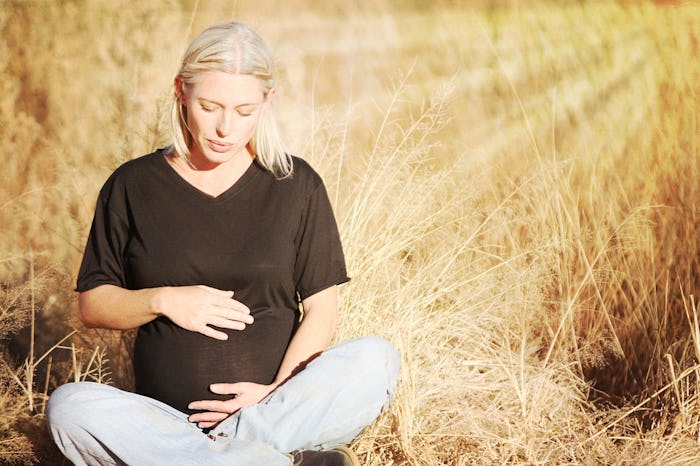If pregnancy were an awards show, the uterus would win leading lady and the vagina would take home best supporting actress. Each take on their own role to make having a baby possible. But while the world watches your belly expand over the course of your pregnancy, there are plenty of unseen changes happening below the belt that only you are privy to. Aside from your doctor, no one else needs to know the about things that happen to your vagina during the third trimester, because things can get pretty strange down there.
Once you make it to the final few months of your pregnancy, you may feel like Stranger Things is a title better suited for what's happening to your vagina. Some pretty bizarre things start to happen (vaginal acne, anyone?) the closer you get to meeting your baby. The good news is, there's really nothing that happens to cause any panic. The majority of these symptoms are temporary and will be a thing of the past once your baby is born.
If you've noticed some changes between your legs and your third trimester creeps along, see if you're experiencing one of these common things that happen to your vagina during this stage of pregnancy.
1You Develop Vaginal Varicose Veins
I know you don't want to hear this, but those varicose veins throbbing in your legs ain't got nothing on the ones that develop in your vageen. According to Mayo Clinic, vulvar varicosities occur during pregnancy due to the extra blood and pressure on your veins as your baby grows. Get some relief with a support garment, going for a swim, and taking frequent breaks from standing.
2You May Experieince Vulvodynia
The name sounds like a place female vampires might hang out, and the actual condition is just as mystifying. As Fit Pregnancy magazine reported, vulvodynia is "chronic pain in the vulvar and vaginal area, but has no obvious source." Although the source is illusive, the pain is real, and many women who suffer from this condition at the end of their pregnancy are concerned with how the ongoing pain will affect their labor and delivery.
3You'll Deal With Discharge
You may notice your vagina producing an overabundance of discharge throughout your pregnancy, but in the third trimester, you'll notice a difference. Due to hormonal changes, discharge becomes thin and watery at the end of your pregnancy, as Parents magazine reported.
4You Feel More Pain
When you're nearing the end of your pregnancy, you may notice you're more uncomfortable than ever. "An occasional sharp pain in your vaginal area during the third trimester of pregnancy is normal due to the pressure on your cervix," as Dr. Sears reported on his website.
5You'll Deal With Swelling
If you're feeling a little larger than life down yonder, it's totally normal at this stage in pregnancy. According to Glamour magazine, your vagina swells toward the end of pregnancy because of how much your uterus has grown and the pressure it puts on your lady parts.
6You Develop Vaginal Acne
It's seems nothing is off limits when you're growing a baby, even a breakout on your lady bits. As Parents magazine reported, vaginal acne can be treated by washing with mild soap and water and applying witch hazel or topical zit cream.
7You May Have Group B Strep
Although it's uncommon, your doctor or midwife will test for Group B Strep in your third trimester. As the American Pregnancy Association explained, Group B Strep is most likely to be detected between week 35 and 37 week of pregnancy. This infection can be treated with antibiotics during labor.
8You'll Itch
The urge to scratch may not be convenient, but it's all too real during pregnancy. With the increase in discharge, your vagina can become irritated, making it itchy, as The Bump pointed out.
9You May Get A Yeast Infection
As your estrogen increases, so do your chances for developing a yeast infection at the end of your pregnancy. According to Baby Center, when you're pregnant, yeast grows faster and easily sticks to the vaginal walls. If you develop a yeast infection while pregnant, talk to your doctor about treatment.
